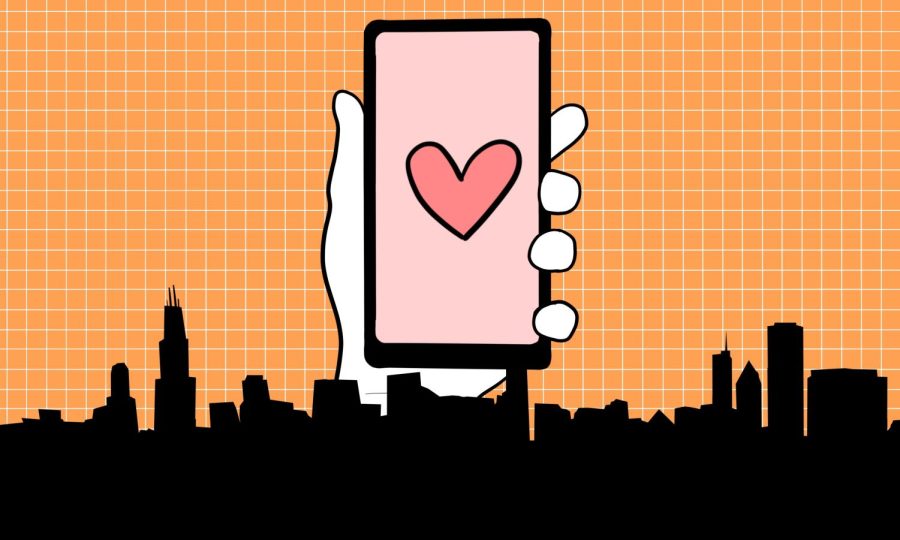‘A gift and a curse’: Social media serves as channel for reproductive justice advocacy
Lisa Battisfore, the founder and president of Reproductive Transparency Now, helped organize the march and is working to spread information — and combat misinformation — about healthcare access in Illinois.
May 13, 2022
Content warning: This story contains mentions of sexual assault and rape.
In January, an Adams County, Illinois justice reversed his decision that convicted an 18-year-old man of rape. The judge said the young man had served enough jail time and threw out his conviction.
But because of an online petition, the case didn’t end there. Carrie Ward, CEO of the Illinois Coalition Against Sexual Assault, said she remembers seeing hundreds sign a petition supporting the 16-year-old survivor, ultimately leading to the judge being reassigned.
In her 25 years of work for ICASA, a network of rape crisis centers across Illinois, Ward said this case showed her how social media can change survivors’ lives.
With a leaked Supreme Court draft opinion threatening to overturn the landmark abortion rights case Roe v. Wade, sexual health advocates are working to broaden their reach using social media platforms. While social media provides a means for activists to raise awareness about sexual healthcare and reproductive rights, some experts say it can also be used to spread misinformation.
“We have seen instances in which social media has been absolutely helpful,” Ward said. “We’ve also seen instances in which offenders have used social media to say horrible things about survivors and share those things far and wide.”
Grace Barter, the campaign and events organizer for Illinois-based reproductive rights advocacy group Personal PAC, said abortion advocates flooded the group’s inbox after a federal court upheld a Texas bill that bans abortion after six weeks of pregnancy.
The amount of people seeking information and support from her organization opened her eyes to how impactful Personal PAC’s social media presence and online resources can be, she said.
“There’s a lot of responsibility with (having a social media presence) and also so much on the line,” Barter said. “It literally is life or death for some people.”
In Evanston/Skokie School District 65, Erin’s Law, which provides guidelines for trauma-informed school programming on sex education and healthy relationships, aims to protect children against sexual violence and online abuse. The state implemented Erin’s Law in 2011, and it has been passed in 37 other states since 2009.
These federal and state guidelines have provided a framework for educators to expand their outreach to social media.
Yet social media can also amplify the messaging of anti-abortion groups, said Lisa Battisfore, the founder and president of Reproductive Transparency Now.
RTN seeks to inform people about Crisis Pregnancy Centers, which often use the same language as abortion providers but ultimately aim to prevent people from getting abortions.
RTN also helped organize Saturday’s rally for reproductive justice in downtown Chicago, drawing thousands to help spread the word about the dangers of CPCs amidst attacks on legal abortion protections.
“Hashtags on Instagram in particular are very important, and what’s really interesting is that a lot of anti-choice organizations will use pro-choice hashtags,” Battissore said. “The messages completely conflict, and since both sides use the same hashtags, it can get confusing.”
Illinois’ Reproductive Health Act, effective since June 2019, recognizes the right of individuals to make autonomous decisions about their health — including the choice to get an abortion. This act, along with a recently repealed requirement for parents to be notified when the minor seeks an abortion, means the state will remain a safe place for abortions regardless of federal changes.
Yet Liv Harmening, an educator at the Northwest Center Against Sexual Assault, said social media has also allowed pro-life groups to “co-opt” the language of trauma-informed care, creating confusion about the legality of these healthcare rights.
“There are plenty of people on social media claiming to be talking about healthcare and reproductive justice, when really it’s a wolf in sheep’s clothing and they are a forced pregnancy center,” Harmening said.
Saunte` Harden-Tate, a community educator and advocate at Pillars Community Health center, said the Chicago-based organization is putting together a series of YouTube videos about online safety and sexual health, the first of which will center internet abuse.
“As a parent myself, I’ve come across many things happening online that I’m really floored about,” Harden-Tate said. “A lot of our survivors who are in their teens meet their perpetrator through social media. And so we just want to make sure that (parents) are keeping them safe and having the tough conversations with them.”
As both educators and policy advocates move their sexual assault prevention efforts to social media, Harden-Tate said being aware of social media as a double-edged sword is essential to achieving justice.
“On one side of it, we’re able to reach those far beyond what we normally would, but also we have a new layer of concern that we have to be mindful about,” Harden-Tate said. “It’s really a gift and a curse.”
Email: lilycarey2025@u.northwestern.edu
Twitter: @lilylcarey
Related Stories:
— A guide to sexual health resources in Evanston, Chicago and beyond
—Thousands gather in Chicago to march for reproductive justice following Roe v. Wade opinion leak
—Northwestern professors, researchers react to draft opinion overruling Roe v. Wade



